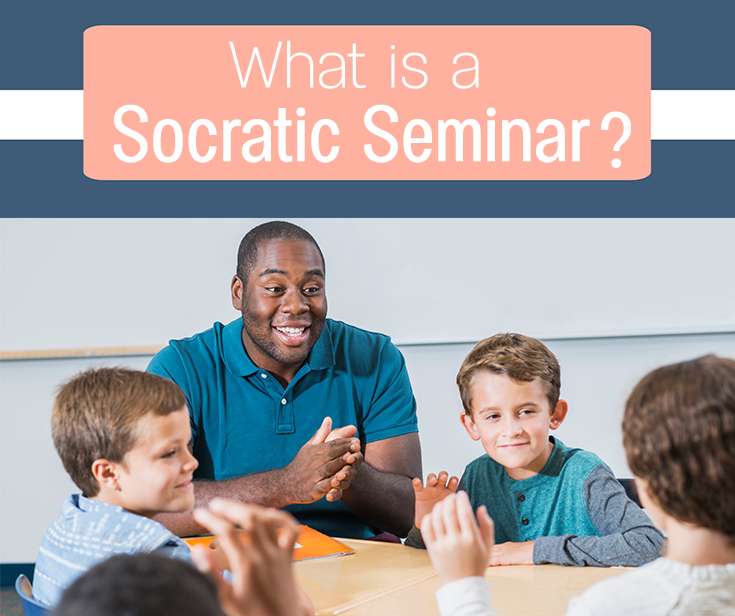Improving Learning through Socratic Seminars
Posted by Network Support · Leave a Comment
Improving Learning through Socratic Seminars
A Socratic Seminar is an active learning strategy that encapsulates the Socrates model of teaching and learning. Socrates, a Greek philosopher, firmly believed in the power of questions as an effective learning tool, and advocated for inquiry-based learning in classrooms. This strategy helps students gain a deeper understanding of textual material, promote active learning, enhance the development of their analytical and reasoning skills, and bring about a growth in their communicative and listening skills.
Elfie Israel defined Socratic Seminar as “a formal discussion, based on a text, in which the leader asks open ended questions. Within the context of the discussion, students listen closely to the comments of others, thinking critically for themselves, and articulate their own thoughts and their responses to the thoughts of others. They learn to work cooperatively and to question intelligently and civilly.”*
Conducting Socratic Seminars
In Socratic Seminars, students are encouraged to actively discuss, critique and reflect on a chosen material giving textual evidence while respecting the opinions and thoughts of others. The success and effective implementation of a Socratic Seminar relies on careful and deliberate planning and execution of a series of steps. These include the following:
1. Choosing the Text:
Selection of text is crucial as students must use it to apply their analytical skills. They must also be prepared with textual evidence to support their opinions and thoughts. For this reason, the text should present an optimal challenge to the students. It should not be so long that it necessitates too much of preparation time. To start with, teachers can choose a prose piece with two or three paragraphs that are sufficiently challenging to the students.
2. Encourage Preparation:
Encourage students to be prepared in advance. This means to form opinions, impressions and refine their thoughts on the material, along with the supporting evidence. Allow them to use post-its and annotations in their text.
To facilitate the thought process, teachers can prepare and hand over to the students a list of leading questions. This is especially helpful during the initial learning phases of the Seminar. With practice, students can be encouraged to frame their own reflective questions to direct their thoughts and critical process.
3. Lay Down the Ground Rules:
One of the primary purpose of Socratic Seminars is to build listening skills and respect for peers. To achieve this, teachers can implement certain rules for the seminar, such as:
- Wait your turn. Although students don’t have to raise their hands to talk, they should wait respectfully for the speaker to finish before voicing their thoughts.
- All agreements and disagreements should be expressed in a courteous manner.
- Frame and state all impressions, thoughts, and opinions clearly, supporting them with textual evidence.
- Maintain eye contact while talking.
- Keep an open mind and be flexible in changing or accepting others’ perspectives. After all the goal of the session is to learn and grow in their understanding of the text.
4. Setting up the Seminar:
The most effective method of setting up the Seminar is the fishbowl method. Students are seated in an inner circle of discussion participants, and an outer circle of recorders.
- Inner Circle Responsibility: Students in the inner circle discusses the questions given to them. Each student can state their thoughts on the question along with their evidence. Others wait patiently for their turn, and can add onto, or disagree with, what is being said. Some prompts that help to lead the discussion include, “Can you show where in the text it says that?” or, “What did you mean when you said…?” or, “Do you think this is what the author meant when he said...”
- Outer Circle Responsibility: Instruct students in the outer circle to evaluate the inner circle participants. Some points for assessment include whether the inner students are actively participating, raising valid points, giving textual evidences to support their claims, and if the participation is done respectfully.
After a pre-designed length of time, the two teams switch positions and continue with the session. At the end of the session, a feedback round can be planned and the outer circle can give any feedback from their recordings.
5. Role of the Teacher:
What do teachers do during the seminar? They act as facilitators and:
- Use prompts or reflective questions to keep the discussion active
- Ensure equal participation by all inner circle students
- Remind students to supply textual evidence
- Remind them about seminar rules – to respect and listen to the speaker
- Indicate to the students when to conclude the discussion and switch roles.
During the initial sessions of conducting a Seminar it may be difficult for teachers to refrain from directing the discussion or pointing out evidence. But always remember that the purpose of Socratic Seminars is to encourage student-led discussions with minimal input from the teacher. Over time, teachers will start observing changes in the students’ behavior with them becoming more confident in their discussion, analytical reasoning skills and listening abilities.
*Israel, Elfie. “Examining Multiple Perspectives in Literature.” In Inquiry and the Literary Text: Constructing Discussions n the English Classroom. James Holden and John S. Schmit, eds. Urbana, IL: NCTE, 2002
Like this article for teachers?
Browse the Professional Learning Board COURSE CATALOG to find related online courses for teachers in your state. Professional Learning Board is a leading provider of online professional development classes that teachers use to renew a teaching license or renew a teaching certificate.





